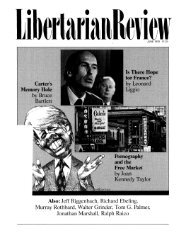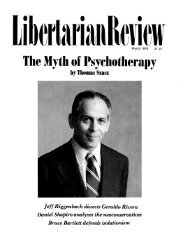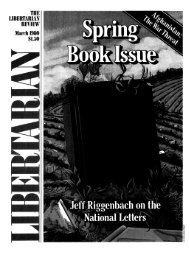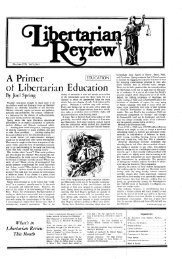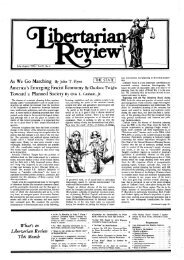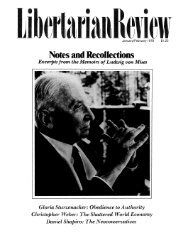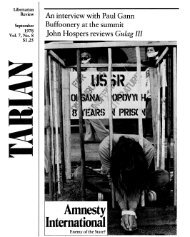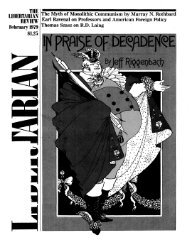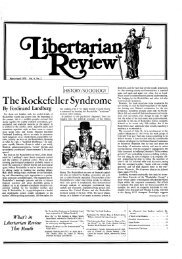The Libertarian Review July 1978 - Libertarianism.org
The Libertarian Review July 1978 - Libertarianism.org
The Libertarian Review July 1978 - Libertarianism.org
You also want an ePaper? Increase the reach of your titles
YUMPU automatically turns print PDFs into web optimized ePapers that Google loves.
enforcement officials to use warrants to search the home oroffice of someone not even suspected of a crime for "mereevidence"-rather than just for the tools or proceeds of acrime) and its 1972 opinion in Branzburg v. Hayes (which,declared that newsmen, like everyone else, were subject tobeing subpoenaed to testify before a grand jury-althoughsuch a subpoena could be contested on First Amendmentgrounds), Zurcher v. <strong>The</strong> Stanford Daily may be thestrongest bar yet f<strong>org</strong>ed for the prison otherwise known asthe American Police State.<strong>The</strong> Washington Post called the decision "the right torummage" in its editorial. Bill Thomas, editor of the LosAngeles Times, declared it was "an incredible decision, aterrible decision. I find it hard to believe that a rationalcourt could issue it." Bob Healy, executive editor of theBoston Globe, asked: "What are you going to do? You'regoing to have to keep your notes in your pocket." And thePost's executive editor, Ben Bradlee, asserted that undersuch a ruling "the Pentagon Papers could never have beenpublished. <strong>The</strong> police would have entered newspaper officesand siezed them, before newspapers could bring thefacts to the people. If this decision were in force duringWatergate, it requires no stretch of the imagination to seepolice in these offices on a regular basis on a fishing expeditionfor Messrs. Nixon, Haldeman, Ehrlichman and company.<strong>The</strong> requirement of a warrant is no real protection,for the government can always find a judge to issue a warrant.It's just plain awful."<strong>The</strong> New York Times, among others, correctly identifiedthe attack launched on the Fourth Amendment and the individual'sright to privacy as a more serious assault thanthe Court's new incursions against the First Amendment.In his column of June 8, Anthony Lewis of the Times professedthat it is "a fundamental mistake ... for the press toargue that it is entitled to different and better treatmentunder the Constitution. <strong>The</strong> First Amendment also protectsthe right of professors and pamphleteers and ordinarycitizens to write and speak freely." He then explained thatany search may be barred as "unreasonable" by the FourthAmendment-"if, for no urgent criminal law need, it damagesother constitutional values: privacy, for example, orFirst Amendment rights." And the Times itselfeditorialized that since the aforementioned Hayden decision,it has become "more probable that searches woulddisrupt the lives of innocent parties who might readilycome into possession of evidence of crime; it was open tothe Court in the Stanford Daily case to require special proceduressafeguarding their interests. Instead, the Courtwould now allow officials to treat the law-abiding likecriminals" (emphasis added).What better description could there be of the way apolice state operates?Subpoenas vs. warrants<strong>The</strong> Stanford Daily's case relied in part on the argumentthat a warrant should never be used against the press, ifnot suspected of a crime, when a subpoena was sufficient.Thus, if there was no reason to believe the third party-inthis case, the press-would destroy the evidence instead ofproducing it in court, a warrant was "unreasonable," andtherefore not permitted under the Fourth Amendment.Justice White, writing for the majority, presented arather restricted view of the history of the Fourth Amendment:Aware of the long struggle between the Crown and the press anddesiring to curb unjustified official intrusions, the Framers tookthe enormously important step of subjecting searches to the testof reasonableness and to the general rule requiring search warrantsissued by neutral magistrates. <strong>The</strong>y nevertheless did notforbid warrants where the press was involved, did not requirespecial showings that subpoenas would be impractical, and didnot insist that the owner of the place to be searched, if the press,must be shown to be implicated in the offense being investigated.Justice John Paul Stevens, in hisdissenting opinion, delvedfurther into the amendment's history (arising from Crownefforts to search press offices for evidence of "seditiouslibel") and thereby showed just how deeply our judicialconcept of privacy has eroded over the last two centuries:<strong>The</strong> Amendment contains two clauses, one protecting "persons,houses, papers, and effects, against unreasonable searches andseizures," the other regulating the issuance of warrant: "no Warrantsshall issue, but upon probable cause, supported by Oath oraffirmation, and particularly describing the place to be searched,and the persons or things to be seized." When these words werewritten, the procedures of the Warrant Clause were not primaryprotection against oppressive searches. It is unlikely that theauthors expected private papers ever to be among the "things"that could be seized with a warrant, for only a few years earlier,in 1765, Lord Camden had delivered his famous opinion denyingthat any magistrate had power to authorize the seizure of privatepapers. Because all such seizures were considered unreasonable,the Warrant Clause was not framed to protect against them.<strong>The</strong> spirit of Classical Liberalism in eighteenth centuryEngland led Lord Camden to adopt his stand on seizures:"Papers are the owners' goods and chattels; they are hisdearest property; and are so far from enduring a seizure,that they will hardly bear an inspection.... Where is thewritten law that gives any magistrate such a power?"<strong>The</strong>se same principles underlie the libertarian position onsubpoenas and warrants: Nothing is subject to seizure-byeither subpoena or warrant-unless it is directly connectedwith a crime (either the proceeds or products of the crime,or the instruments used to perpetrate it), and no one'sproperty is subject to search unless that person is involvedin the crime.This position implies that just as the seizure of "mereevidence" from unincriminated third parties is prohibited,so is the seizure of verbal evidence from such individuals:i.e., testimony cannot be coerced, so no third party can besubpoenaed to testify. Certainly, they should be asked toappear in court, but there are two key reasons why it is immoralto coerce testimony. First, if we are free to speakwhat we want, why does the principle change if we want tosay nothing? Freedom of speech necessarily includes thefreedom of silence. Secondly, forcing a witness to testifymay jeopardize that person's safety. How many governmentwitnesses have been assassinated before they took thestand? And how many others have developed defective28<strong>Libertarian</strong> <strong>Review</strong>



